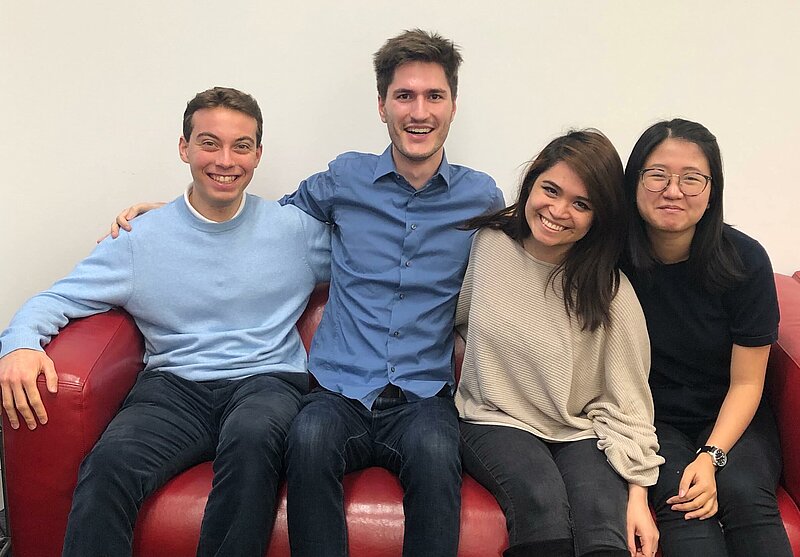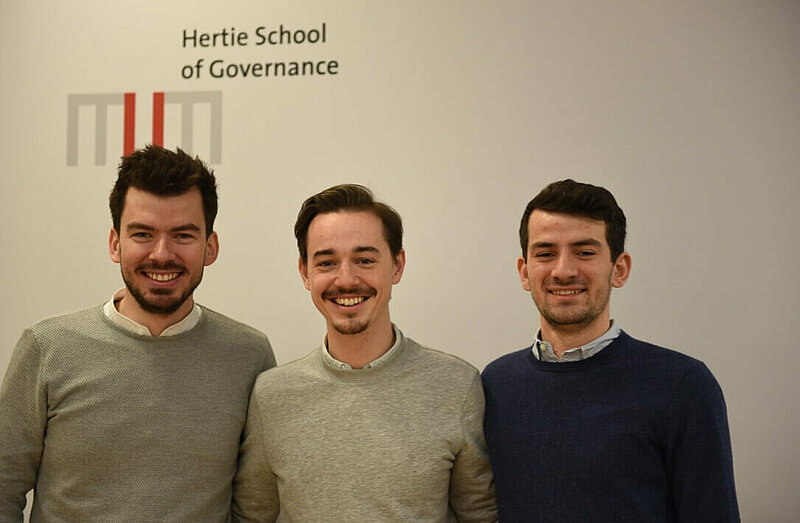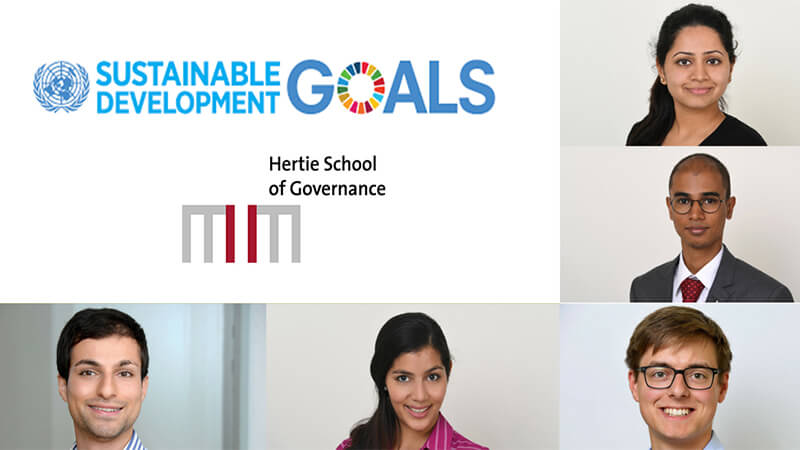Students will present an array of creative, applied solutions for UN SDG goals.
Four Hertie School teams are off to Singapore this week to participate in the annual conference of the Global Public Policy Network (GPPN). The 15 students will compete with teams from other GPPN schools around the world with their concrete solutions for meeting the United Nations’ Sustainable Development Goals (SDG).
The rotating conference is hosted this year by Lee Kuan Yew School of Public Policy at the National University of Singapore. The student teams present prototypes of their innovative, applied SDG solutions to a jury consisting of the leadership of the seven GPPN member universities. The topics are: good health and well-being; affordable and clean energy; sustainable cities and communities; responsible consumption and production; climate action; peace, justice and strong institutions.
The four Hertie School teams were selected in a pitch event in November from 15 applicants. The students receive a 500-euro travel award, and accommodation provided by the host. Winning pitches included an app that tackles food poverty and access to fresh produce, an app that improves the coverage of first responders in emergencies, an app that provides users with videos and information on first aid, and a website that guides students through the process of selecting and applying for university.
The conference also includes a programme for GPPN university presidents and deans, where they meet and discuss topics relevant to public policy higher education around the world. In addition, the first cohort of GPPN SDG Professional Certificate candidates will present their projects. The certificate is a one-year training programme for international collaboration on the SDGs, and includes students from the GPPN member universities.
GPPN is a partnership between seven prestigious universities in public policy: the Hertie School, The School of International and Public Affairs (SIPA) at Columbia University, the Institute of Public Affairs at the London School of Economics and Political Science, School of Public Affairs at Sciences Po, Lee Kuan Yew School of Public Policy at the National University of Singapore, the Graduate School of Public Policy at the University of Tokyo, and the Business Administration School of São Paulo at the Getulio Vargas Foundation.
Check out our students’ projects for the Singapore conference:

HandyHelp
Mufaddal Tambawala, Andres Ponce, Madison Wilson, Turner Lott, Ben West
Around the world, many people fall victim to preventable deaths, simply because of they fail to receive simple first aid care. Often, ordinary citizens can come to the rescue, but don’t know how. HandyHelp is an app that provides users with comprehensive, simple-to follow videos and first aid information. The idea is to leverage the more than 4 billion cell phone and 2 billion smart phone users worldwide to offer fast, life-saving medical information. It offers a quick navigation to a situation profile, allowing the user to input available materials. The app will have localized content everywhere it is rolled out, and will have strong visual and audio tools for low-literacy contexts.

Rescue Gazelles
Fabian Masarwa, Louis Jarvers, Julius Kerkhoff, Subiksha Natarajan
Eight minutes is the crucial timespan in which a death from a cardiac arrest or other critical emergencies can most likely be avoided. In cities worldwide, due to traffic jams and a lack of paramedics, people in both developing and developed countries die on a daily basis because ambulances arrive too late. Rescue Gazelles aims to tackle this life-threatening problem by improving the coverage of first responders with a simple, sustainable and cost- efficient approach. Medically qualified volunteers, connected through our app to emergency centres and cooperation partners, rapidly react to nearby emergencies until professional medics arrive. With Rescue Gazelles’ profound incentive structure, we further promote citizen engagement and enhance our network to respond to every critical emergency and build a safer community. Our solution tackles Sustainable Development Goals from diverse topics such as Health, Sustainability, Green Energy, and the Improvement and Inclusivity of communities. Thus, with Rescue Gazelles, cities around the world become safer, greener and more inclusive.

Project NEAT
Tokenising Food Vouchers. Tackling the Problem of Food Poverty
Andrea Giuliani, Alex Russman, Allison Koh, Yuan Ting Lee
In 2016, around 815 million people, or 10.7% of the world’s population, were considered to be in food poverty. This complex issue is partly due to geographical and economic barriers to accessing healthy food. In the United States, food stamps for low-income recipients were phased out in the early 2000s and replaced with Electronic Benefit Transfer (EBT) systems, which directly transfers funds to be used at supermarkets and other food providers. While this system has proven effective at promoting the purchase of healthier food, equipment costs have held back the spread of this technology. Our solution to this shortcoming uses mobile and blockchain technology to distribute vouchers via a set of tools including secure smart wallets and scaling solutions for high transaction volumes. It addresses key challenges identified by the SDG 12: Ensuring sustainable consumption and production patterns.

Formazione Facile
Tim Stadtaus, Christian Davenpon, Andrea Zorzetto
Among advanced economies, Italy has the greatest economic inequality after the US and the UK, based on wealth distribution. Inequality is driven by a lack of higher education: 50% of central Milan’s inhabitants are university graduates, while the share of graduates a few km away is below 10%. This is even worse in southern Italy. But there is no central platform offering comprehensive information on university courses, fees, cost of living and funding opportunities. Our website “Formazione Facile” will guide students through the process of selecting and applying for university, answering questions like: why it pays off to pursue a degree, what to study and where, how to apply and get funding. As the platform gathers data on students, it will use AI to provide individualised information to each user. Making education more accessible to all has wide-ranging effects: improving health, making cities more socially cohesive and sustainable and society as a whole more just. Thus, Formazione Facile will directly impact SDGs 11, 16 and 3. People with a degree have a higher life expectancy, are less likely to commit a crime and are more conscious about politics, civic life and the environment.

Making sustainable choices:
Labels for a world free of plastic
SDG Certificate Candidates
(counter-clockwise from left)
Yilmaz Akkoyun, Angela Galeano-Colonia, Felix Amelung, Gaurav Ganti, Shraddha Iyer Raghupathi
We are a student project supporting the development of a plastic-free label. Our aim is to bridge the gap between the SDG framework and CSR programs to create synergies between consumers, businesses and governments to fight plastic overproduction and overconsumption. We believe that small but scalable practices, such as the introduction of a plastic-free label, have the potential to make sustainable options more accessible to all in their daily lives.

